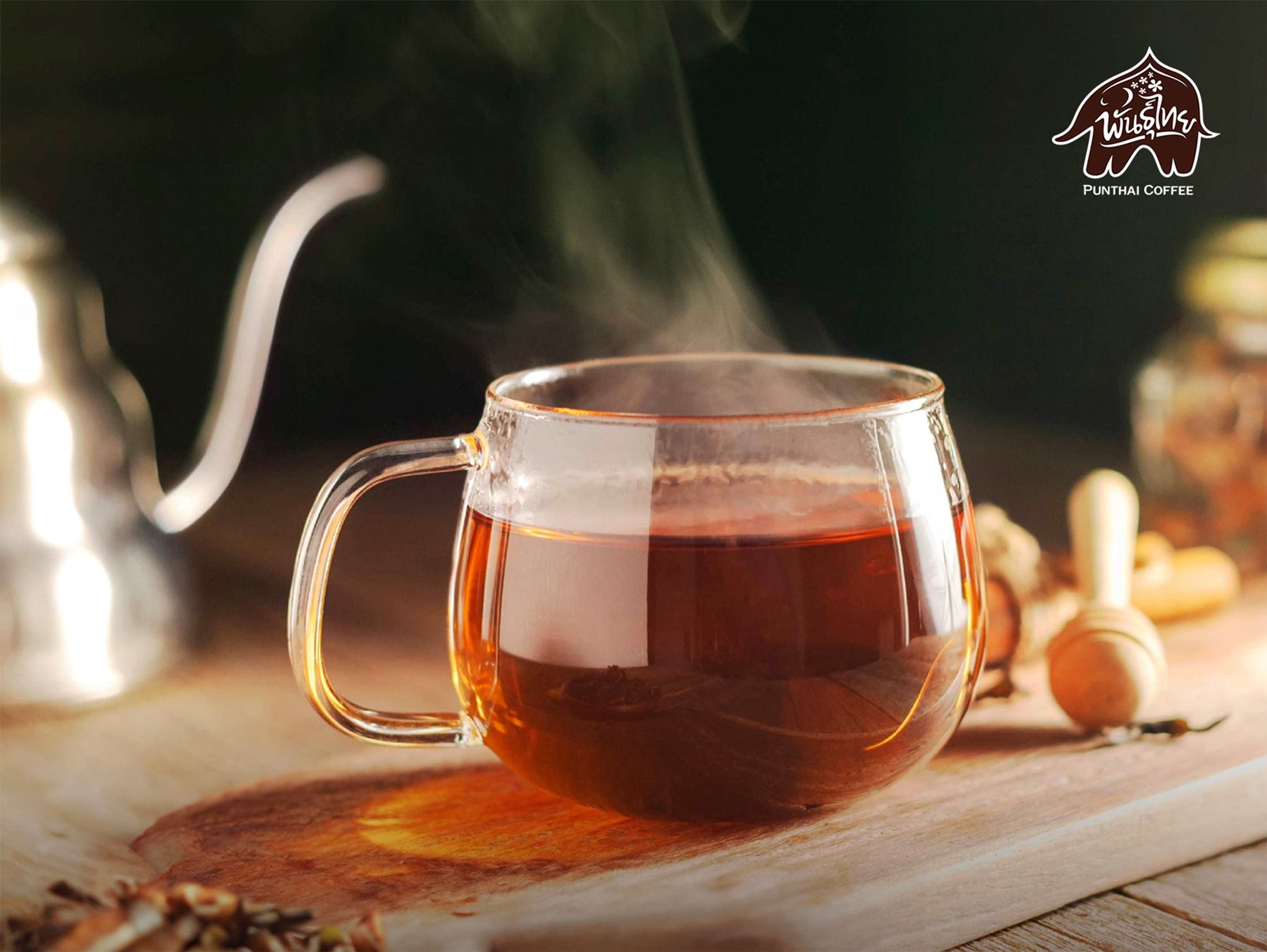
Exploring the Benefits of Assam Tea: Premium Organic Thai Tea
What exactly is Assam tea? You may have heard of black tea, red tea, green tea, and oolong tea, but today, PunThai will shed light on the curiosity surrounding "Assam tea," including delving into profound benefits of Assam tea or "Nan tea," properties that surpass what many have yet to discover. Additionally, we will explore the array of Assam tea menus offered by Thai cultivators, products stemming from organic farms in Nan province.
The Origin of Organic Assam Tea or Nan Tea
Assam tea, a globally popular black tea, is produced from the organic Assam tea plant (Camellia Sinensis var assamica) grown in the Assam region of India. This tea thrives in areas with moderately high altitudes and is well-suited for cultivation in tropical regions, resulting in its robust flavor and vibrant color. These distinctive traits have made Assam tea widely recognized worldwide.
.jpg)
A Brief History of Thai Assam Tea Cultivation in Northern Thailand
Many may not realize that tea cultivation in Thailand is as popular as coffee cultivation in the mountains. Historically, tea cultivation thrives in warm, rainy regions, thus predominantly found in Asian territories such as China, India, and Sri Lanka, typically at altitudes ranging from 1,000 to 2,000 meters above sea level. In Thailand, tea is commonly grown in the northern region, particularly in Chiang Rai, followed by Chiang Mai, Phrae, Nan, and Mae Hong Son. While Chinese tea varieties were predominant in the past, the cultivation of organic Assam tea in Thailand has surpassed that of Chinese tea since 2015. Thai Assam tea production has consistently increased, with over 90% of the total tea production in Thailand being Assam tea by 2018 and surpassing 90% in 2022.
The Origin of Assam Tea in Nan Province
Assam tea, also known as Nan tea, originated from the Assam region of India and was introduced to Nan province over a century ago, during the reign of King Rama V of Thailand. Legend has it that during the late 19th century, nobles from Nan observed tea plants flowering while on a visit to Chiang Rai province. Fascinated, they brought back some plants to cultivate in Nan. Initially, tea was grown for household consumption or basic use in kitchen gardens. However, as its cultivation expanded, becoming an essential economic crop for Nan residents, the province gradually became a significant producer of Assam tea, earning it the special moniker "Nan Tea."
Distinctive Characteristics of Assam Tea Leaves
Physical Characteristics, Flavor, and Aroma of Nan Tea Leaves
1. Physical Characteristics
- Leaves: Dark green, relatively large and wide, with deep veins around the edges.
- Stem: Mature plants can reach heights of approximately 6-18 meters, medium to large-sized shrubs with smooth bark and tender young branches covered in soft hair.
- Flowers: Clustered blooms, each cluster containing about 2-4 flowers, with 5-6 petals per flower, each of varying sizes and elongated shapes.
- Seeds: Round and relatively hard with smooth brown or dark reddish-brown surfaces.
- Fruit: Capsule-like appearance, with shells splitting open when ripe.
2. Flavor and Distinctive Aroma
- Nan tea leaves offer a slightly brisk and subtly sweet taste.
- They possess a unique, intense aroma that tends to linger and captivate the senses.
- When brewed, Nan tea exhibits a rich and robust flavor profile, offering a dense and satisfying taste.
3. Environmentally Friendly Attributes
Nan tea cultivated in the province is predominantly grown using organic methods, free from chemical pesticides.
The cultivation, harvesting, and processing techniques remain traditional and environmentally friendly, in harmony with nature.
6 'Ultimate' Things About 'PunThai Assam Tea' from Nan by PunThai and Singha Park

PunThai invites you to taste 'PunThai Assam Tea' from Nan by PunThai and Singha Park. It is grown by Thai farmers on organic farms in the mountainous areas of Nan province. This tea has outstanding qualities in terms of its physical characteristics, as well as the flavor and aroma of the tea leaves. This Assam black tea variety is grown in the lush forests of mountain valleys. Importantly, we pick only the first 5 leaves of the tea buds, giving the tea an aromatic scent and intense flavor. The fresh tea buds are sent directly to the processing plant, the only one located near the growing area in Nan province. With meticulous brewing for every cup, every cup of PunThai tea is imbued with the premium quality of the outstanding and unique tea leaves.
1. The Ultimate of Tea Variety
PunThai carefully selects premium Assam tea varieties grown intentionally by Thai farmers in Nan province.
2. The Ultimate of Growing Area
The 'organic farms' growing area in the lush forests of Nan province gives the Thai Assam tea its special characteristics unlike any other.
3. The Ultimate of Tea Leaves
We only pick the first 5 leaves of the tea buds to obtain the ultimate in flavor and intensity.
4. The Ultimate of Freshness
Trust us for freshness, as the processing plant is located near the growing area, perfectly preserving the quality of the tea leaves.
5. The Ultimate of Meticulousness
PunThai Nan tea is brewed fresh for every cup to extract the full distinct aroma in the roasted tea style.
6. The Ultimate of Various Menus

6 menus, 6 characters of Nan tea, guaranteed to never be the same! Creating new and exciting experiences for you every day.
- Berry Assam Tea: Aromatic, sweet, refreshingly berry
- Yuzu Assam Tea: Tangy and delightful, fall in love with the yuzu citrus
- Peach Assam Tea: The sweet-tart peach perfectly complements the bold Nan tea
- Plum & Lime Assam Tea: The saltiness of plum balanced by the tartness of lime, invigoratingly refreshing
- Original Assam Hot Tea: Pure Assam with no additions, the full-bodied tea taste
- Honey Lime Assam Hot Tea: Hot Assam tea with honey lime, quenching with tangy sweetness
Health Benefits of Assam Tea, Invaluable Properties

Now that we know about the origins of Nan tea, the distinctive Thai Assam tea with its outstanding qualities of freshness and the meticulous attention to PunThai Assam tea menus, many may wonder what Assam tea health benefits offer. Today, PunThai lists the virtues of Assam tea, which are more than just its flavor.
1. Health Benefits of Assam Tea: Helps Protect Skin from Sun Damage
Some research suggests that drinking Assam tea may help protect skin from harmful UV radiation by reducing inflammation from sunburn and cell damage caused by free radicals. Additionally, the phenolic compounds found in Assam tea may help maintain skin elasticity and slow aging. Furthermore, the caffeine and tannins in Assam tea have properties that help shrink pores, reduce puffiness, and brighten skin.
2. Health Benefits of Assam Tea: Helps Prevent Alzheimer's Disease
Studies have highlighted the benefits of Assam tea in preventing Alzheimer's disease. Experiments have shown that compounds found in black teas like Assam can inhibit the activity of certain enzymes linked to dementia. Particularly, studies found black tea inhibits the activity of the beta-secretase enzyme involved in producing amyloid-beta, suggesting consumption may help slow Alzheimer's progression.
3. Health Benefits of Assam Tea: Aids Digestion
Preliminary research suggests the polyphenol compounds in black tea like Assam may act as prebiotics in your digestive tract. Prebiotics serve as food for the beneficial bacteria in your gut, promoting their growth and restoring balance of gut microbiota, potentially leading to better digestion.
4. Health Benefits of Assam Tea: Reduces Risk of Heart Disease
Numerous studies have indicated the heart health benefits of Assam tea in reducing the risk of heart disease. Experiments found those drinking 3 cups of black tea daily had a lower risk of heart disease due to Assam tea's high flavonoid content. These antioxidants have anti-inflammatory and immune-boosting properties. They're found to improve heart health by reducing blood clotting, inflammation, and improving blood vessel function to promote efficient blood flow.
5. Health Benefits of Assam Tea: Promotes Strong Teeth and Oral Health
Assam tea leaves contain natural polyphenol compounds with antimicrobial effects that can inhibit the growth of oral bacteria, reducing risks of cavities and gum disease. Some studies also found the fluoride content in this type of tea may help strengthen tooth enamel and prevent cavities.
6. Health Benefits of Assam Tea: Helps Lower Blood Cholesterol
Multiple studies found the polyphenol compounds in Assam tea can help lower blood cholesterol levels. These are believed to inhibit cholesterol absorption from the diet and promote its excretion from the body.
7. Health Benefits of Assam Tea: Helps Control Blood Pressure
Assam tea has properties that aid in controlling blood pressure levels. Research suggests the flavonoids in black teas like Assam may promote better blood pressure regulation. These flavonoids may improve blood vessel function, promoting desirable elasticity and dilation to help maintain normal blood pressure.
8. Health Benefits of Assam Tea: Reduces Cancer Risk
One scientific study examined the potential of Assam tea's compounds in reducing the risk of certain cancers. It found the polyphenols in black tea may inhibit tumor growth and possibly destroy cancer cells. Assam tea also contains antioxidants that help protect against cell damage from free radicals.
Assam tea, a quality tea with invaluable health virtues. With this knowledge, ask yourself - have you tried drinking Assam tea yet? If not, what are you waiting for? Order PunThai Assam tea for delivery right now by visiting PunThai website and selecting your favorite Assam tea menu. Or for non-tea drinkers who prefer coffee, we also have plenty of popular coffee and other PunThai menus available. Order now!
Reference:
https://www.dtn.go.th/th/file/get/file/1.20220412d41d8cd98f00b204e9800998ecf8427e103113.pdf
http://teashadee.lnwshop.com/article/5/%E0%B9%80%E0%B8%A3%E0%B8%B7%E0%B9%88%E0%B8%AD%E0%B8%87%E0%B8%99%E0%B9%88%E0%B8%B2%E0%B8%A3%E0%B8%B9%E0%B9%89%E0%B9%80%E0%B8%81%E0%B8%B5%E0%B9%88%E0%B8%A2%E0%B8%A7%E0%B8%81%E0%B8%B1%E0%B8%9A%E0%B8%8A%E0%B8%B2#:~:text=%E0%B8%A5%E0%B8%B1%E0%B8%81%E0%B8%A9%E0%B8%93%E0%B8%B0%E0%B8%97%E0%B8%B2%E0%B8%87%E0%B8%9E%E0%B8%A4%E0%B8%81%E0%B8%A9%E0%B8%A8%E0%B8%B2%E0%B8%AA%E0%B8%95%E0%B8%A3%E0%B9%8C%E0%B8%82%E0%B8%AD%E0%B8%87%E0%B8%8A%E0%B8%B2,%E0%B8%88%E0%B8%B0%E0%B9%80%E0%B8%9B%E0%B8%A5%E0%B8%B5%E0%B9%88%E0%B8%A2%E0%B8%99%E0%B9%80%E0%B8%9B%E0%B9%87%E0%B8%99%E0%B8%AA%E0%B8%B5%E0%B9%80%E0%B8%97%E0%B8%B2
https://www.tea-and-coffee.com/blog/assam-tea-benefits



